Vasile Ladislau Pop (1819–1875) came from a priestly family of noble origin, living in Berind (Berend, Kolozs County). He was the second of the ten children of priest Ananie Pop and his wife, Anastasia. He attended elementary, secondary, and high school classes at the Roman Catholic (Piarist) High School in Cluj, where he was among the most diligent pupils of his generation. During this formative period he received a middle name that is the translation from Romanian into Hungarian of his first name (Vasile, which became Ladislau), thus resulting in his full name Vasile Ladislau Pop. After graduating from high school in 1835, he enrolled at the Faculty of Law in Cluj, which he graduated three years later. In 1838, thanks to his father’s intervention with Ioan Lemeni (1780–1861), the Greek Catholic Bishop of Blaj, he obtained a scholarship to study at the Theological Faculty of the University of Vienna, as a student of the Saint Barbara Seminary. Four years of theological studies followed in the capital of the Austrian Empire, where young Vasile Ladislau Pop completed his formative profile with theoretical notions and the German language, which were to be particularly useful in his later career. The Viennese studies facilitated his insertion into an extremely complex formative environment, which allowed access to readings and ideological trends that proved to be particularly stimulating for his political and cultural horizon. It was during this period that Vasile Ladislau Pop came to study the works of Transylvanian Romanian illuminists, such as Petru Maior (1756–1821), Gheorghe Șincai (1754–1816), and Samuil Micu (1745–1806), who historically and linguistically affirmed and legitimized the Roman origin of the Romanians as an indisputable argument for recognizing the Romanians as a political nation with equal rights alongside the other political nations in Transylvania.
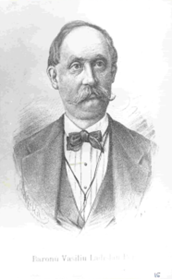
Image source: “Oameni de știință și cultură din Reghin și împrejurimi”, Album, 11, Petru Maior Municipal Library (Biblioteca Municipală Petru Maior), Reghin, http://www.bibliotecareghin.ro/index.php?Book=43.
After completing his studies in Vienna, Vasile Ladislau Pop returned to Transylvania, where he was appointed teacher of mathematics at the Theological Seminary in Blaj. Although he taught there for only three years, until 1845, his pupils and posterity remember him as the first teacher who taught mathematics in Romanian at the Seminary in Blaj. During the time he spent in Blaj, he also met a new generation of teachers, such as Ioan Rusu (1811–1843), Ioan Cristoceanu (1810–1844), and Demetriu Boieriu (1812–1871), with whom he became close. With some of them, he established a long-lasting friendships. We particularly refer to the teacher, historian, philosopher, and politician Simion Bărnuțiu (1808–1864), with whom he shared the same ideals and political-cultural projects aimed at the recognition of political rights for the Romanians in Transylvania.
His friendship with Bărnuțiu drew him into the Lemeni conflict in Blaj, during the period 1843–1846, between the new generation of teachers and the older one grouped around Bishop Ioan Lemeni, which led to his expulsion from Blaj.
The road to “Vienna, to the Emperor’s right hand”
For Vasile Ladislau Pop, the expulsion from Blaj (1845) was a major turning point in his professional career. Sent by his father to study theology to become a priest, but expelled by his bishop because of divergent opinions, Vasile L. Pop decided to abandon his clerical career for good to pursue a legal career. That was the moment in which he promised his father that he would only return home when he “arrived at the right hand of the Emperor”. Consequently, in the same year 1845, he enrolled in law studies at the Royal Board (Court of Appeal) in Târgu Mureș, which he graduated in 1848, obtaining a lawyer’s diploma. He began his career in Reghin, where he had met the young Elena Olteanu in 1846, and married her in the autumn of 1848. From the very beginning of his legal career, he benefited from the support of the Olteanu family and their relatives, which made it easier for young Vasile L. Pop to enter the intellectual circles of Transylvania. Vasile L. Pop’s in-laws, a family of merchants, enjoyed a good reputation in the area, and Elena’s maternal uncle, also a merchant, openly assumed his support for the two.
In 1849, Vasile L. Pop was appointed district commissioner in Reteag (Bistrița County), and shortly afterward, legal advisor at Bistrița Justice Court. It was the beginning of an ascending administrative-political career, which took him, in the next two decades, to the highest positions and dignities held by a Transylvanian Romanian until then. After working as a legal advisor in Bistrița (1852) and as a legal advisor at the Supreme Court in Sibiu (1854), he was promoted to a legal advisor at the Ministry of Justice in Vienna (1859). The peak of his career came in the years of the “liberal thaw” at the beginning of the seventh decade of the nineteenth century, when he was named vice-president of the Transylvanian Government and president of the Transylvanian Supreme Court. In 1863, he was appointed private councilor of the Emperor. He was only 45 years old at the time and had managed, thanks to the superior education he had benefited from and to the support of his parents-in-law’s family, to take up some of the highest state positions held by a Romanian up to that point. He also participated as a deputy in the proceedings of the Transylvanian Diet in Sibiu, in 1863 and 1864. In that capacity, he helped to draft laws meant to establish rights for the Romanians, which were going to be equal with those of the other nations inhabiting Transylvania.
With the signing of the Austro-Hungarian Compromise of 1867, Vasile L. Pop was designated vice-president of the Court of Cassation in Budapest, a position he held until the end of his life. Moreover, in recognition of his merits in the service of the Romanians of Transylvania, in 1868, he was elected chairman of the Astra Association (Transylvanian Association for Romanian Literature and the Culture of the Romanian People). He died on February 17, 1875, in Budapest, and was buried in Reghin, in the Olteanu family crypt.
The case of Vasile L. Pop is a good example of the social mobility of an individual who, coming from a priestly family, left this socio-professional category and pursued a legal career, which propelled him to the top of the political pyramid of Transylvania in the years of Austrian neoliberalism. Pop’s marriage to Elena Olteanu, her family’s support, and the kinship networks created around this family contributed to his social ascent.
Bibliography:
Federațiunea, 11–12, MDCCCLXXV, 9/21 February 1875, 33.
Transilvania. Foia Asociațiunii transilvane pentru literatura și cultura poporului român, 5, VIII, 1 March 1875, 49–51.
Nicolae Comșa, Dascălii Blajului. Seria lor cronologică cu date bio-bibliografice (Blaj: Tipografia Seminarului, 1940).
Elie Dăian, Al doilea președinte al Asociațiunii: Vasile L. bar. Pop 1819–1875 (Sibiu: Editura “Asociațiunii”, 1925).
Family of Johann Ignaz Liebieg
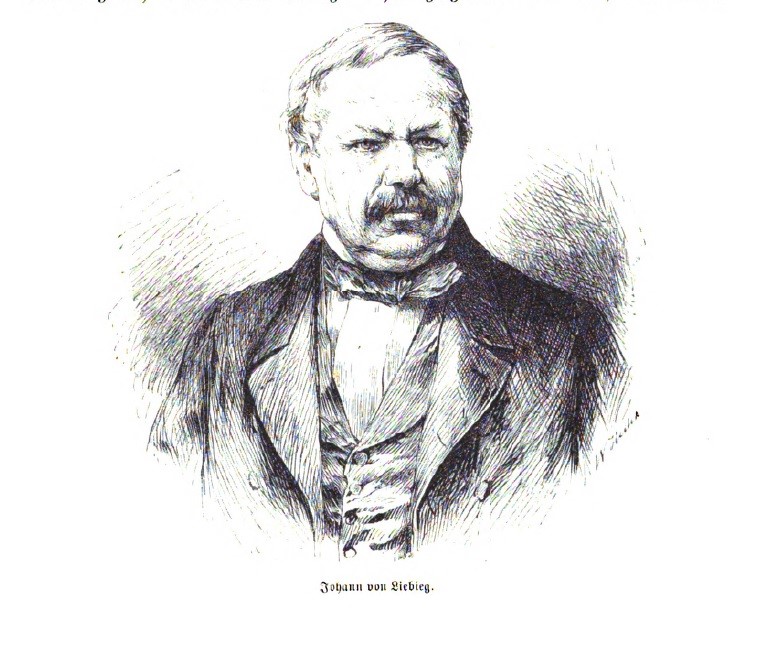
Johann Liebieg Österreichisch-ungarische Monarchie in Wort und Bild, s. 661
Johann Ignaz Liebieg (1802–1870, newspaper entries of funeral and obituary) personifies one of the most successful businessmen and industrialists in the Habsburg monarchy of the 19th century. Johann Ignaz belonged to the so-called Gründer generation; in cooperation with his brother and other family members, he managed to build a huge textile empire in the Liberec region, which lasted for several generations, surviving the turbulent periods of workers' strikes, economic crisis and both world wars. Johann Ignaz Liebieg became involved in public life at the beginning of the 1850s as a co-founder and leader of the Liberec Chambers of Commerce, co-founder of the Liberec Savings Bank, between 1851–1859 he was president of the Liberec Chambers of Commerce and Trade and in 1851–1864 a city representative. In the 1960s, his public representative activities led to the highest councils - he sat in the Bohemian Diet and in the Austrian Imperial Council in Vienna for the curia of Czech cities. However, he ended his political engagement after three years by relinquishing his mandate. Johann Ignaz Liebieg was primarily a factory owner and entrepreneur. He devoted his life to taking care of the family business to ensure a better livelihood for his children. In 1868, Johann Ignaz Liebieg was elevated to the hereditary status of free lords for his services to the upliftment of industry.[1]
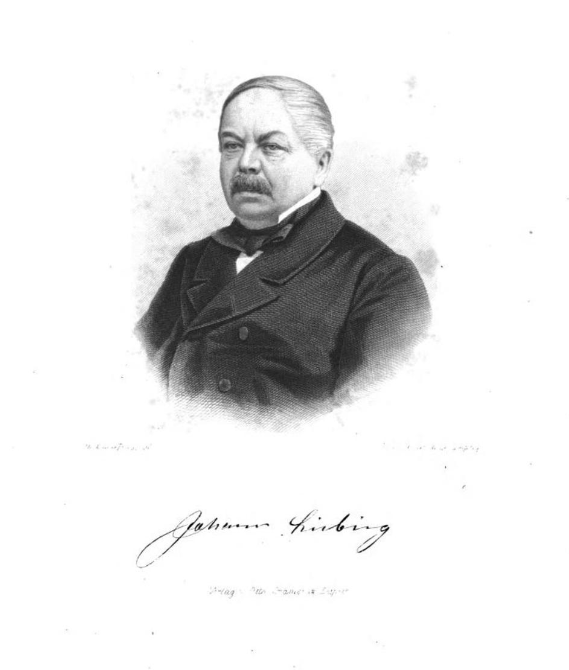
Johann Ignaz Liebeig Ein Arbeiterleben Geschildert von Einem Zeitgenossen
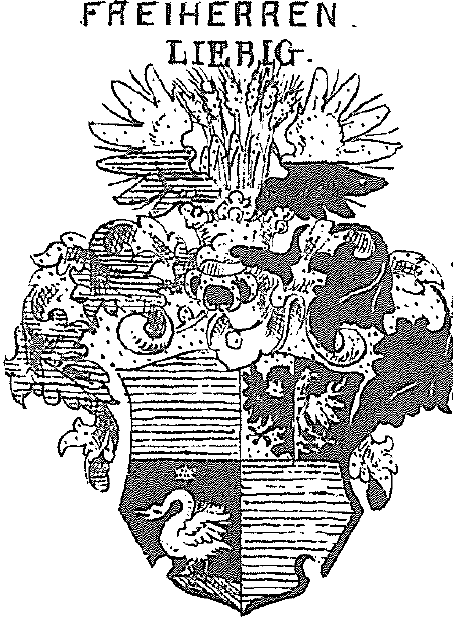
Arms of Liebiegs
Johann Ignaz Liebieg was born into the family of Franz (1769–1811), a Broumov burgher, draper and merchant. Textiles also had a tradition in the Liebieg family. Already Johann Ignaz's great-grandfather was a burgher from Broumov and made his living as a braider, and his grandfather Joseph Liebieg was a cloth merchant. Johann's other two siblings lived to adulthood, the first-born Franz Joseph (1799–1878) and their youngest sister Pauline (1808–1883). The father died prematurely when the eldest Franz Josef was 12 years old, and the mother was responsible for the upbringing of the children. Her relatives occasionally helped her with her three offspring in Broumov. Johann Ignaz was apprenticed to the Broumov master weaver and friend of his late father, Kaspar Werner, and then spent several months as a journeyman travelling "for experience". In 1819, Johann Ignaz settled in Liberec, where he was later joined by his older brother. The two siblings ran a small goods shop, in which their sister Pauline also helped them. Thanks to Franz Josef's experience and thrift, Johann Ignaz's business talent and innovative ideas, as well as the right selection of goods, the brothers were able to expand their shop and warehouses. Soon they also bought their first factory and the family business gradually began to expand.[2]
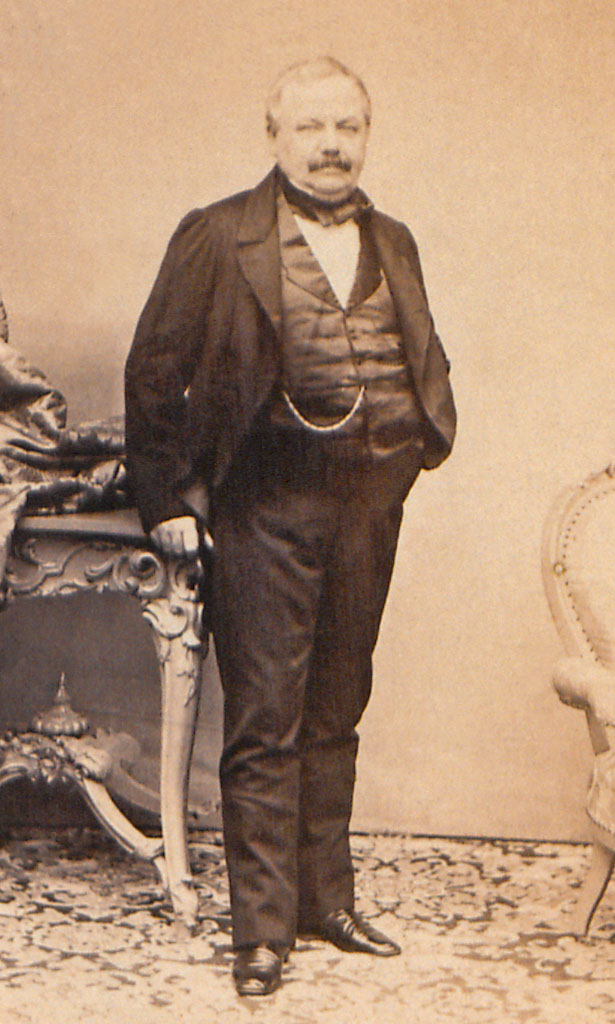
Johann Ignatz Karl Liebieg
Johann Ignaz Liebieg subordinated one of their business strategies, marriage policy, to the successful family business. In August 1832, at the age of 30, Johann Ignaz Liebieg married Maria Theresa Münzberg (1810–1848), the daughter of a merchant and textile manufacturer from Jiřetín pod Jedlovou.[3] Her father, Anton Münzberg (1765–1823), owned a linen, cotton and woollen goods factory. In 1820 he built a family villa in Jiřetín pod Jedlovou, connected with a complex of factory buildings.[4] Johann Ignaz invested the considerable dowry brought into the marriage by Maria Theresa in the expansion of his business.[5] Maria Theresa died at the age of 38 as a result of pulmonary paralysis, leaving behind a widower, Josef Ignaz, with nine[6] children.[7] In 1853, less than five years after his wife's death, Josef Ignaz remarried. His second wife was Marie Ludovica (1830–1891), née Jungnickel, granddaughter of Anton Münzberg.[8] Four sons were born to Johann Ignaz from his second marriage.[9]
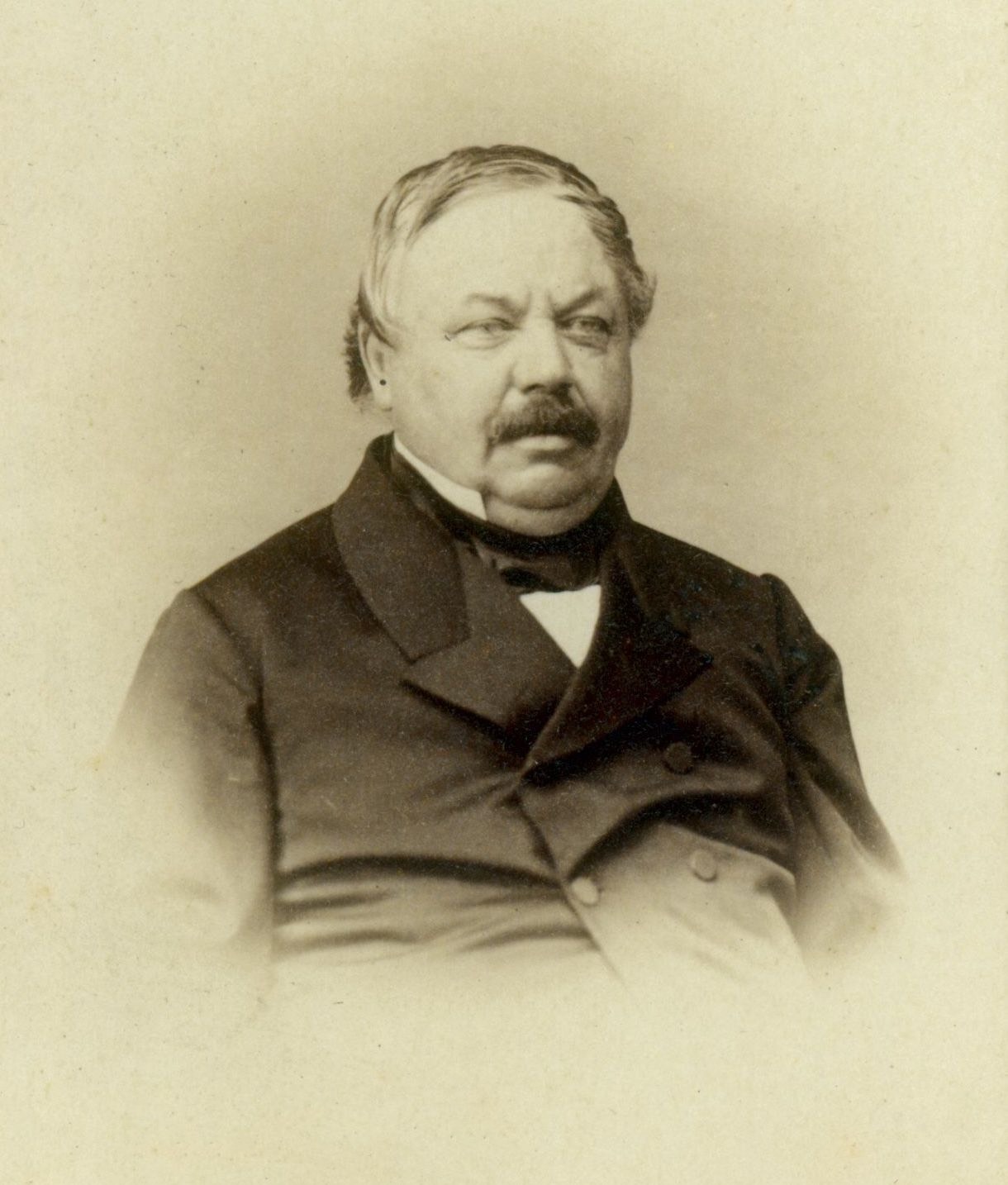
Johann Liebieg
Johann Ignaz built a large family in the style of the Austrian Biedermeier. On the one hand he strove to provide for his family by expanding his business, on the other hand, he prudently ensured the continuity of the family company.[10] Johann Ignaz Liebieg married five daughters (the eldest, Maria Paulina, never married) and four sons (two of whom married after their father's death). No correspondence has survived in the family archives that sheds light on the Liebieg children's choice of partners. It can be assumed, however, that these were 'good catches' for all involved (the Liebigs), who had the potential to preserve and expand the family fortune, to advance up the social ladder, and were personalities with undeniably interesting contacts and access to information. The partners of Liebieg's descendants were either businessmen involved in the family business or landowners and politicians with influence at local or provincial level. At the same time, joining the Liebieg empire may have offered some partners an extension of their own business activities within the Habsburg monarchy.
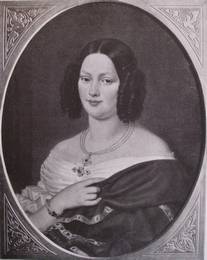
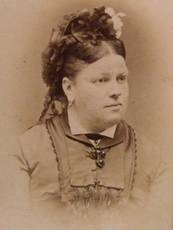
Maria Theresia Münzberg Maria Luisa Jungnickel
Members of the two German merchant families Mallmanns and Clemens joined the Liebieg family business after their marriage. Both families came from the Rhineland, the Mallmanns from Boppard and the Clemens from nearby Koblenz. Josef Mallmann, the husband of Adelina Liebieg,[11] traded overseas, and in Paris he and his brother Gerhard (and husband of Adele's sister Hermine) ran the export firm Mallmann et Co. The Mallmann brothers had business contacts in Europe, South and North America, the Caribbean, India and China. After his marriage to Adelina, Joseph Mallmann became a partner in Liebieg's company and took over the management of its Vienna branch. In addition to his many business activities, he also served as president of the South-North German Connecting Railway (between Pardubice and Liberec) and the Austrian North-Western Railway (Děčín-Vienna connection).[12] Josef Mallman became an Austrian citizen and for his services he was knighted in Austria.[13]
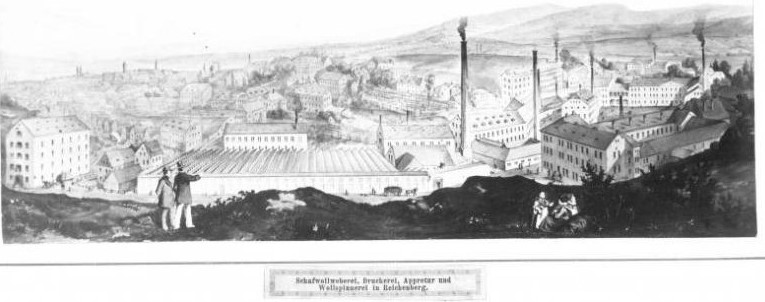
Factory of Johann Liebieg
Liebieg's son Theodor (1840–1891) married Angelika Clemens (1847–1919), daughter of the merchant and banker Johann Peter Clemens from Koblenz. Theodor Liebieg belonged to the second generation of Liebigs who inherited and managed the North Bohemian textile empire. After his marriage to Angelika, his two brothers-in-law, Gisbert and Leo Clemens, joined the management of the company.
In addition to merchants and businessmen, as mentioned above, the Liebieg family included landowners with representation in the land diets and the Austrian Imperial Council. Adolf Ritter von Zahony (1833–1907), the owner of the farm and castle in Bohemia and husband of Leontina Liebieg, sat in the Bohemian Diet.[14] Ritter von Zahony sat in the Landowners' Curia for the Party of the Constitutional Landowners (1872–1883). Daniel Weinrich (1843–1926),[15] husband of Marie Liebieg and owner of an estate in Bohemia, also held a seat in the same curia and party. In 1872–1883 and 1901–1907 he was a deputy of the Bohemian Diet for the Landowners' Curia, and later a member of the Imperial Council (1873–1878), where he represented the Party of the Constitutional Landowners.[16]
At the Austrian diets were: Bertha Liebieg's husband, Karl Reichsfreihrer von Gagern (1846–1923). Karl von Gagern was a member of the Upper Austrian Diet for the Landowners' Curia. Von Gagern served in the diplomatic service and was appointed Legation Councillor in The Hague in the late 19th century.[17] Leopold Mayr, a builder, architect and vice-mayor of Vienna, was also a member of the Lower Austrian Diet. Leopold Mayr was the father-in-law of Johann Josef Liebieg (1836–1899).
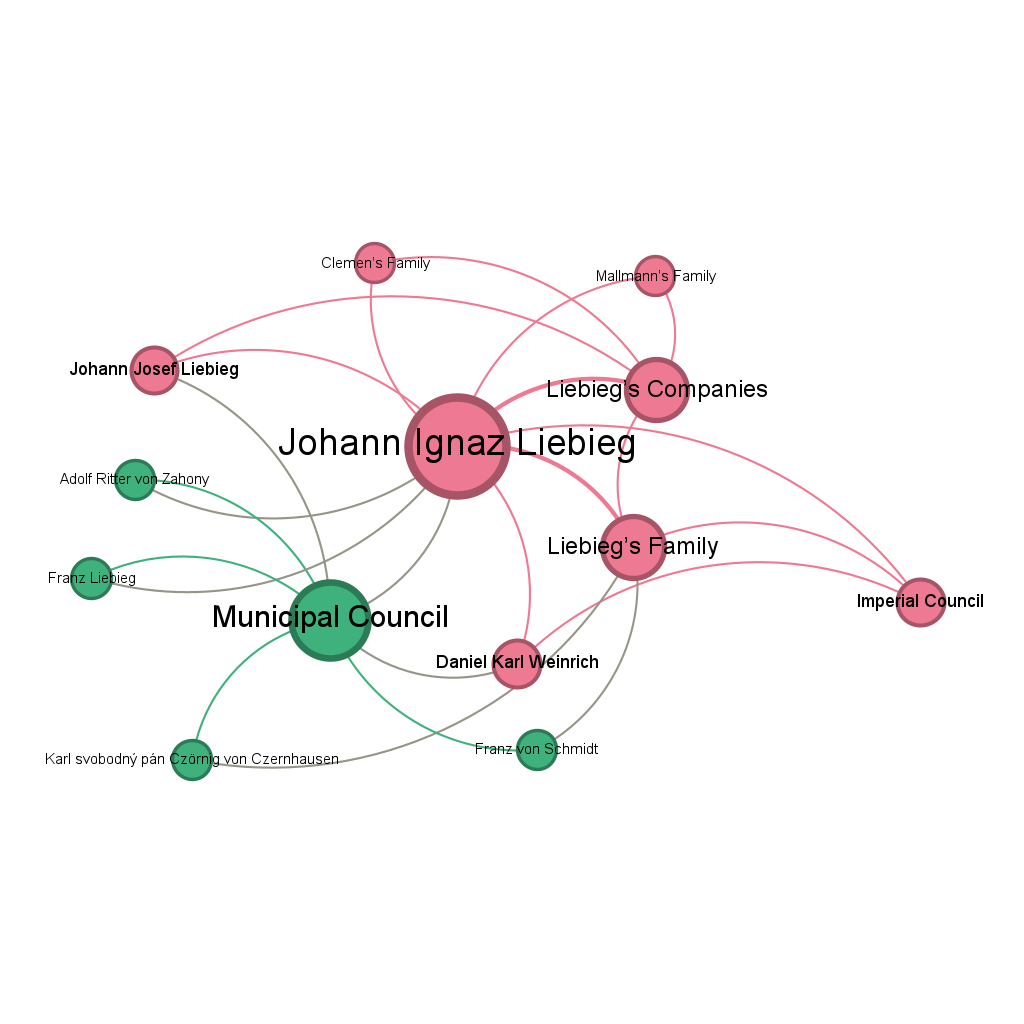 From the point of view of social networking, not only those marriages of Johann Ignaz's children that were contracted and where his business acumen was evident are of interest, but also those that did not take place. One example can be reconstructed. Johann Ignaz's step-aunt Franziska and her husband Peter Fügner imagined for their children a career similar to that of the Liebieg brothers."Johann Liebieg (1802–1870), the founder of the famous Liberec factories, was a role model for both his father and mother, and they made no secret of their wish that their son Jindřich would either show similar business agility to their relative or at least marry into the family of this famous Liebieg."[18] In the end, however, Jindřich Fügner (1822–1866) showed neither "liberalistic energy and fierceness" nor interest in becoming part of the Liebieg clan.[19] He found his niche in physical education and became one of the founders of the Czech gymnastic association Sokol. According to surviving reports, the marriage of Jindřich Fügner to the Liebieg's eldest daughter, Maria Paulina, was probably considered. The family's interpretation of events in the memoirs of Fügner's daughter Renata Tyršová gives the impression that the emotional Jindřich did not want to be part of the predatory and expanding Liebieg empire. On the other hand, it is worth considering that he was not chosen by Johann Ignaz Liebieg. In fact, the same source describes the beginnings of the business career of Jindřich Fügner, who, although had travelled extensively in Europe and supplemented his education with a private tutor in Prague, had no entrepreneurial spirit and no desire to become involved in business in any way. For Johann Ignaz Liebig, he could not have been the ideal partner to whom he could later hand over a share in the family business.
From the point of view of social networking, not only those marriages of Johann Ignaz's children that were contracted and where his business acumen was evident are of interest, but also those that did not take place. One example can be reconstructed. Johann Ignaz's step-aunt Franziska and her husband Peter Fügner imagined for their children a career similar to that of the Liebieg brothers."Johann Liebieg (1802–1870), the founder of the famous Liberec factories, was a role model for both his father and mother, and they made no secret of their wish that their son Jindřich would either show similar business agility to their relative or at least marry into the family of this famous Liebieg."[18] In the end, however, Jindřich Fügner (1822–1866) showed neither "liberalistic energy and fierceness" nor interest in becoming part of the Liebieg clan.[19] He found his niche in physical education and became one of the founders of the Czech gymnastic association Sokol. According to surviving reports, the marriage of Jindřich Fügner to the Liebieg's eldest daughter, Maria Paulina, was probably considered. The family's interpretation of events in the memoirs of Fügner's daughter Renata Tyršová gives the impression that the emotional Jindřich did not want to be part of the predatory and expanding Liebieg empire. On the other hand, it is worth considering that he was not chosen by Johann Ignaz Liebieg. In fact, the same source describes the beginnings of the business career of Jindřich Fügner, who, although had travelled extensively in Europe and supplemented his education with a private tutor in Prague, had no entrepreneurial spirit and no desire to become involved in business in any way. For Johann Ignaz Liebig, he could not have been the ideal partner to whom he could later hand over a share in the family business.
Johann Ignaz prepared his children for a very different entry into life than he himself had. His descendants received a private education and the opportunity to study at foreign universities, inherited a noble title, social status and a fortune estimated at 30 million guldens in his time. Each handled their inheritance differently, according to their own values and individual convictions. However, one can observe a continuity of ties to foreign businessmen and merchants and a striving for inclusion in higher noble society. From the point of view of maintaining the family business, Johann Ignaz did everything possible to ensure that the transfer to the new generation went smoothly. Coincidentally, in the third generation, the company passed to his grandson Theodor Liebieg (1872–1939), who ran it successfully for almost 50 more years. Political reasons finally deprived the heirs of the Liebieg empire of all their property in Bohemia (worth 140 million Czechoslovak crowns) in the 1940s.
[1] National Archives, ČZS, ka. 201, 201b, fol. 657, Liebieg Johann.
[2] Např. ANSCHIRINGER, Anton: Johann Liebieg. Ein Arbeiterleben Geschildert von Einem Zeitgenossen. Leipzig: Verlag von Otto Spamer, 1871; Franz Liebieg. Wien: Selbst-Verlag, 1873; Allgemeine deutsche Biographie. Bd. 18, Lassus – Litschower. Leipzig: Duncker&Humblot, 1883; MALÝ, Jakub. Stručný všeobecný slovník věcný: (malý slovník naučný). Díl VIII. V Praze: I. L. Kober, 1884, s. 168; MERAVIGLIA-CRIVELLI, Rudolf Johann. J. Siebmacher’s Großes und Allgemeines Wappenbuch. IV/9. Der Böhmische Adel. Nürnberg 1886, s. 77, Taf. 48; ERSCH, Johann Samuel. Allgemeine Encyklopädie der Wissenschaften und Künste in alphabetischer Folge. Zweite Section. H–N. Leipzig: F. A. Brockhaus, 1889, s. 372–374; PETHES, Justus. Gothaisches genealogisches Taschenbuch der freiherrlichen Häuser. Dreiundvierzigster Jahrgang. Gotha 1893, s. 518–520; Ottův slovník naučný: ilustrovaná encyklopaedie obecných vědomostí. Část 15. V Praze: J. Otto, 1900, s. 1051; WIESINGER, Udo B. "Liebieg, Johann Freiherr von". In: Neue Deutsche Biographie, 14 (1985), s. 493–494 [online]. Dostupné z: https://www.deutsche-biographie.de/pnd137847602.html#ndbcontent (cit. 26. 6. 2022). Dále např.: SCHILLER, Karl. Umrisse einer allgemeinen Geographie: mit besonderer Rücksicht auf Oesterreich. Umrißeeiner Handels-Geographie für Deutschland und insbesondere Oesterreich: mit einschlagender Lectüre. Zweiter Theil. Wien: Druck von Anton Schweiger, 1864. s, 84–87; RESSEL, G. A.: Nordböhmisches Industrie-Album: die Stättenheimischer Arbeit in Wort und Bild. I. Heft. Teplitz: Im Selbstverlag, 1874, s. 3–14; Die Österreichisch-ungarische Monarchie in Wort und Bild. Böhmen (2 Abtheilung). Band 15. Wien: K.K. Hof- und Staatsdruckerei, 1896, s. 660–662; RESSEL A.: Verdiente Männer aus Ostböhmen als Wappenerwerber. In: Jb. d. Dt. Riesengebirgs-Ver. f. d. J. 1927, 16. Jg., 1927, s. 24-58. Z novějších prací: RANDÁK, pozn. 1, BERGMANNOVÁ, pozn. 2, HLAVÁČ, Miroslav M. Tvůrci českého zázraku. Praha: APS Agency, 2000, s. 111–114; MYŠKA, Milan. Historická encyklopedie podnikatelů Čech, Moravy a Slezska do poloviny XX. století. Ostrava: Ostravská univerzita, 2003, s. 273–278. Franz Liebieg, pozn. 3; ERSCH, Johann Samuel. Allgemeine Encyklopädie der Wissenschaften und Künste in alphabetischer Folge. Zweite Section. H–N. Leipzig: F. A. Brockhaus, 1889, s. 372–374.
[3] State Regional Archives in Litoměřice (hereinafter referred to as SRA Litoměřice), Roman Catholic Parish Office (hereinafter referred to as FÚ) Jiřetín pod Jedlovou, Register of Marriages 1784–1840.
[4] National Heritage Institute, Monument Catalogue, Vila Antona Münzberga. [online]. Available from: https://www.pamatkovykatalog.cz/vila-antona-munzberga-15548297 (Cited 26. 6. 2022).
[5] MYŠKA, Note 2, p. 274.
[6] Josef Ignaz Liebieg and Maria Theresia Münzberg had a total of 11 children, two of whom died a few months after birth: first-born Ludwig (*† 1833), daugter Ida (1844–1845).
[7] SRA Litoměřice, FÚ Liberec, Register of Deaths 1824–1848.
[8] SRA Litoměřice, FÚ Jiřetín pod Jedlovou, Register of Marriages 1841–1876. Anton Münzberg married three times in total. From the first marriage in 1787 14 children were born, in 1800 twins, one of them was Francisca, later married to Johann Jungnickel. With his second wife Anton Münzberg had a daughter Maria Theresia, married in 1832 to Johann Liebieg. At that time, her older half-sister Francisca already had a two-year-old daughter Maria Ludovica Caroline, the future second wife of Johann Ignaz Liebieg. Liebieg thus married first Anton Münzberg's daughter from his second marriage and then his granddaughter from his first marriage.
[9] Of his four sons from his second marriage, died in infancy Oscar (*1855–†1856).
[10] HLAVAČKA, Milan a BEK, Pavel. Rodinné podnikání v moderní době. Praha: Historický ústav, 2018. p. 26–29.
[11] SOA Litoměřice, FÚ Liberec, Register of Marriages 1848–1861.
[12] MARSCHNER, Erhard. Mallmann, Josef Ritter von. In: Neue Deutsche Biographie (NDB). Band 15, Duncker&Humblot, Berlin 1987, p. 737.
[13] MARSCHNER, Erhard. Mallmann, Josef Ritter von. In: NeueDeutscheBiographie (NDB). Band 15, Duncker&Humblot, Berlin 1987, p. 737.
[14] Die Arbeit, 1907, 14. Jahrgang, No. 981 (4. August 1907), p. 4.
[15] Weinrich, Daniel Karl (Karl Daniel)“. In: Republik Österreich Parlament [online]. Available at: https://www.parlament.gv.at/WWER/PARL/J1848/Weinrich.shtml (Cited 14. 7. 2022).
[16] WURZBACH, Constantin von. Biographisches Lexikon des Kaiserthum Oesterreich. Wien: Druck und Verlag der k. k. Hof – und Staatsdruckerei, 1886, p. 58–61.
[17] (Linzer) Tages-Post, 59. Jahrgang, No. 8 (12. Jänner 1923), p. 4.
[18] BARTOŠ, Josef. Vývoj osobnosti Jindřicha Fügnera. Sokol, 1933, Year. 59, No. 12, p. 258–264.
[19] TYRŠOVÁ, Renata. Jindřich Fügner: paměti a vzpomínky na mého otce. Part 1. Praha: Český čtenář, 1924, p. 30.

